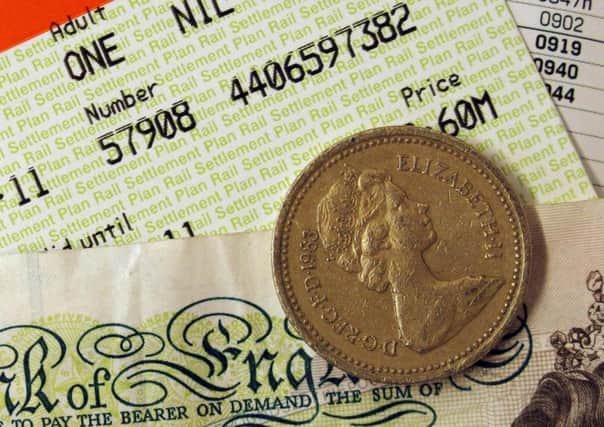Rail fares hike ‘dwarfs pay rises’


The latest rise, which takes effect on Friday, will see regulated fares, which include season tickets, increasing by up to 2.5% and fares overall going up by an average of 2.2%.
Those commuting to London from Milton Keynes in Buckinghamshire, for example, will have to contend with a 2.43% rise, with their 2015 ticket going up to £4,888.
Advertisement
Hide AdAdvertisement
Hide AdAccording to CBT, the cost of a Milton Keynes season ticket has risen 23.5%, or £930, since January 2010 and is one of a number of fares that have increased around four times more than average wages over this five-year period.
The CBT also highlighted the cost of a Newcastle to Middlesbrough season ticket, which will be £2,324 from Friday and has risen 26.3% since January 2010.
Other examples of large increases on season tickets since January 2010 given by CBT are Ashford International to London (up 22.0%), Oxford-London (up 22.0%), St Albans-London (up 22.0%), Leeds-Sheffield (up 23.5%), Leicester-Derby (up 22.5%) and Bristol-Bath (up 22.4%).
CBT said average wages had risen by just 6.9% since January 2010.
Advertisement
Hide AdAdvertisement
Hide AdCBT’s public transport campaigner Martin Abrams said: “Yet again, the Government is hiking up commuter rail fares. Ticket prices are rising much faster than wages, which means getting to work takes up an increasing share of incomes, hitting both household budgets and the economy.
“The Government urgently needs to adopt a fairer approach to ticketing, bringing fares down and introducing more flexible tickets to help groups like the millions who work part-time.”
Rail union the RMT has also bemoaned the fare rise, which comes at a time when commuters have had to contend with constant late autumn and early winter disruptions to rush-hour services.
Last weekend overrunning Christmas engineering work led to chaotic scenes at King’s Cross and Finsbury Park stations in north London and threw the spotlight on Network Rail’s top bosses’ salary levels and bonus structure.
Advertisement
Hide AdAdvertisement
Hide AdThe RMT published figures which it said showed that Government subsidies to train companies came to just over £4 billion in 2012/13.
RMT general secretary Mick Cash said: “As the travelling public gear up for the new year fares hike, we are blowing away the myth that the extra cash is invested back into services when in fact it combines with taxpayer subsidies to fuel a £4 billion privatised rail rip-off that is a one-way ticket to the bank for the train companies.”
He went on: “The scandal of the British people paying the highest fares in Europe to travel on clapped-out and overcrowded trains will be compounded by the new year average rise - an increase which dwarfs average pay increases and which will hit the poorest the hardest.”
Mr Cash said the RMT would step up the fight for the renationalisation of the railways.